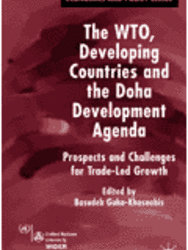Book
The WTO, Developing Countries and the Doha Development Agenda
Prospects and Challenges for Trade-led Growth
These are turbulent times for the international trading community, the WTO in particular. Although Cancun failed,
- Can the WTO still reassert its development-credibility by ensuring that Doha truly becomes the Development Round?
- What should the negotiating strategy of the developing countries be?
- Will the political constituencies in the OECD allow reform of their domestic policies that benefit the developing countries?
- How big are the regional disparities in the effects of agricultural trade reform in the developing countries?
- Are the Preferential Trading Agreements doing enough for the least developed countries?
- How much more can the US, the EU and Japan do to increase developing countries' exports?
These and other vital questions are addressed in this volume which has been prepared within the UNU-WIDER project on The Impact of the WTO Regime on Developing Countries.
 Join the network
Join the network